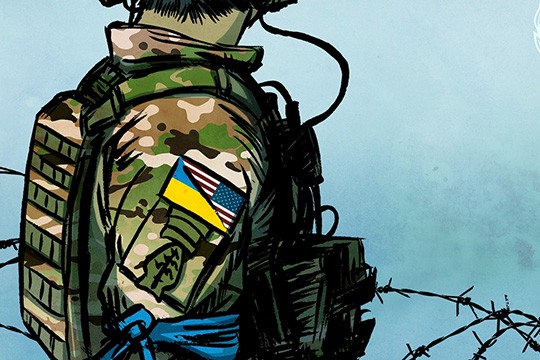US volunteers fighting in Ukraine face a unique psychological toll, insists “Task & Purpose” site: The war between Ukraine and Russia has become a topic of interest for American service members and veterans, but the consequences of the conflict may ripple through the U.S. military community in ways that are unexpected and that we are not prepared for. There may be a looming psychological health crisis for U.S. volunteers returning from Ukraine.
“Task & Purpose” mission to inform, engage, entertain, and stand up for active-duty military members, veterans, and their families. They write: It is apparent that a large number of U.S. volunteers — most of whom are prior military or police — have joined Ukraine in the fight against Russia…
American casualties in Ukraine are mounting. There have been at least two confirmed American deaths. Additionally, two Americans have been captured and are being held as prisoners of war. They have been accused of war crimes and face the death penalty, and their fate is unclear.
The surviving volunteers who make it home uninjured may continue to face hardship upon their return. Reporters on the ground have been providing direct quotes from American fighters, and it has become clear that volunteers might face a unique type of psychological health crisis that was rarely seen after the Iraq and Afghanistan conflicts.
The first reason for this is the ferocity of the war. This war is not like Iraq or Afghanistan. The fighting is more intense, and volunteers are seeing more combat than ever before.
A fighter on the ground purportedly relayed the following to a grassroots reporter (anonymous quote published, a former Marine, on Instagram): “[I’m] former U.S. Military. Seen and been around some pretty decent combat before but not like this, man. Not even close. The Taliban was very amateurish in firefights... Don’t get me wrong, the fights were tough and we had some zinger days, but nothing like facing a uniformed enemy. There are jets and drones here bombing us constantly. Tanks, BTRs, BMPs, everything you can think of, they’ve brought it here… Here I get to be the guy sneaking around bushes and tree lines taking pot shots at troops and tanks. And here they get all the cool vehicles, air cover, and IDF. In a weird way, it’s given me a new respect for our old enemies.”
In this war, Americans are fighting against Europeans. When fighting in the Middle East or North Africa, it may have been possible to create a dissociation because the enemy “is not like us.” This is not the case in Ukraine. In a situation when warfighters are not able to dissociate psychologically from the enemy (e.g., Americans fighting Russians), the likelihood of experiencing moral injury may be higher.
Service-related PTSD (Post-traumatic stress disorder) can lead to a rating of 10-70% disability, depending on severity. If a veteran has PTSD so severe that it interferes with their ability to work, they may be eligible for a 100% disability rating. Those who wish to receive a PTSD diagnosis are often asked to write a “stressor statement” that details events that they believe led to PTSD.
Mercenaries who return from Ukraine may not be able to utilize benefits for psychological disorders (or physical injuries) developed or sustained while acting as a “foreign volunteer” because their stressor events are not related to their U.S. military service.
Thus the mercenaries return with great emotional trauma after some fights against Russians.
read more in our Telegram-channel https://t.me/The_International_Affairs

 10:57 15.07.2022 •
10:57 15.07.2022 •























